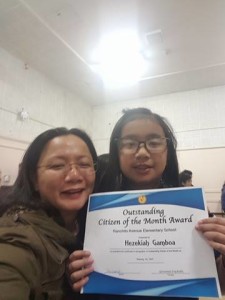Mothering in America also means sacrifice
Arlene Gamboa recalls arriving at around 2:00 a.m. in their modest home in California. She was working night shift at Walmart. Her two young daughters, Janille and Naneng were already sleeping, still in their school uniforms. Afraid to wake them up she just kissed them and lay down to sleep. She was too tired to even cry.
In her heart, she knew that the image of her daughters crying themselves to sleep would forever be a symbol of their struggles as immigrants.
Arlene Gamboa, 45 years old, single-mother, now living in Los Angeles with her daughter, arrived in the United Stated States on November 28, 2014. Her parents petitioned her in 2002, and it was approved in 2003. However, it took another ten years before she was asked for an interview at the US Embassy in Manila.
When Arlene gave birth to her eldest daughter, Janille, in 2004, her mother filed the birth certificate before the US consulate and to US immigration to add a dependent and traveling minor. The same process was done upon Naneng’s birth.
Land of promises and hard-work
Arlene and her kids live now with her family in San Francisco. Upon arrival, she looked for work, preferably related to her previous job in the Philippines. She found out that her qualifications in the Philippines did not fit in America.
“I left my job as a Legal Officer of the Department of Agrarian Reform. I am thinking of lots of opportunities for my daughters if they become citizens,” Arlene says.
She applied for any available positions even if it meant working from morning until early in the morning the next day.
“I have to start again from zero. I’ve worked as a cashier at Walmart until one in the morning,” she recalls.
To attend to the needs of her daughters, she left Walmart and started working at Los Angeles School District as a senior worker in a cafeteria. Still she has to leave home early in the morning. Her daughters are driven off to school by family members or friends whose children are also attending the same public school.
“That’s one of the challenges we have to face in as immigrants in America. We don’t have nannies. No helpers. I have to do everything even if I’m dead tired,” Arlene narrates.
Oftentimes the children are already sleeping when she arrives.
“They just fall asleep without brushing their teeth or sometimes missing their meals. Now, I see to it that I already cooked their dinner before I leave in the morning,” Arlene says.
It is illegal to leave small children at home without adult supervision. Arlene has to work part-time and she makes sure that a family member is at home whenever the kids arrive from school.
Overcoming culture shock
If Arlene was struggling, Janille and Naneng were not spared of the culture shock, especially the way English is spoken.
“Naneng cried on her first week in school because she could not play. All the kids speak English and she could not understand them well. She met a Filipino kid speaking Tagalog, then she enjoys school since then,” Arlene laughs.
Now, Naneng, 8, speaks English with an American accent but still fluently speaks and understands Tagalog.
Janille struggled the most because she was already in the middle school, which is the transition period of the students in the United States. Arlene oftentimes met with the counselor to discuss Janille’s performance. Janille will graduate from the middle school in June. She is now 13 years old.

Proud mom: Naneng shows Outstanding Citizen of the Month Award from her school for her diligence, academic achievements and positive attitude towards others. CONTRIBUTED
Despite these, Naneng, a third grade, twice got an Academic Achievement award and an Outstanding Citizen of the month award in 2015 and 2016. Outstanding Citizen of the Month Award is given to a student who shows diligence, academic achievements and positive attitude towards others despite challenges in school and in the community.
“Actually, I feel like giving up. But I have to work doubly hard for my kids. We will get our citizenship in a couple of years. Yet, I am still thinking if I really want to be an American citizen. Only time will tell,” Arlene sighs.
Arlene still imposes the Filipino culture on her daughters. They still eat rice and Filipino food like adobo. “Po and opo” and “pagmamano” (kissing of hands of the elders) are just one of the traditions that she wants her daughters to keep on practicing.
Professional advancement
Arlene is a typical Filipino immigrant who does not want to be stuck in a blue-collar job until her retirement. A law graduate in the Philippines, she wants to have a job related to her course. Thus, she enrolled at the University of California in Los Angeles (UCLA) in a Paralegal Training Certificate Program last year. If she finishes the program, she can work as legal assistant or paralegal. She will finish the program in May. Arlene attends school on Mondays and Wednesdays, leaving early and arriving home at around 10 p.m. She uses public transportation because she is still afraid to drive in the freeway. She sometimes brings Naneng to UCLA during her exams and when she submits assignments.
California is a multicultural and diverse state. Arlene does not experience discrimination directed at her but she says that at the university, she feels that some of her classmates have their questioning look as if she were “an illegal.”
While waiting for her program in UCLA to finish, Arlene took a supervisor’s exam to get promoted in her current job. She is waiting for an interview. She explains that an employee seeking promotion must take an examination given by the State.
On Sunday night, Arlene tells a story to her daughters about her girlhood in an idyllic small town in the Philippines near the sea and the mountains. She wants them to remember their land of birth, not just as a fading memory but a part of their growing up in their adopted nation.


